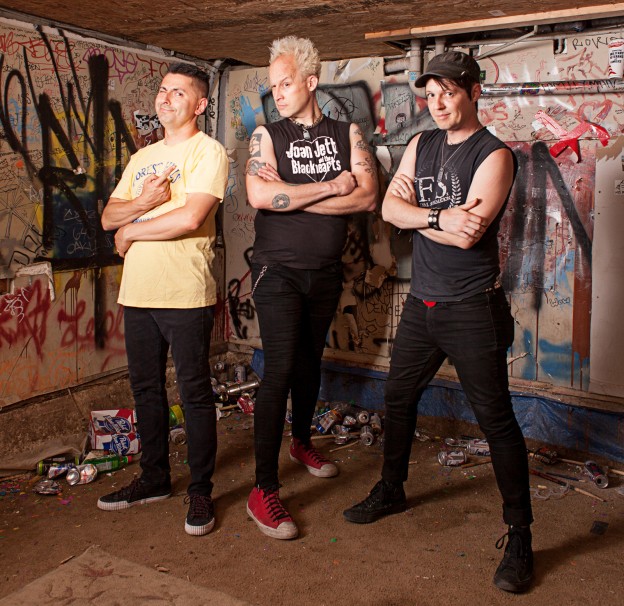The Secretions are explicit in their support of the local punk scene, and front-and-center to that support has been an openness to the bands that have come up in their wake—many of which feature members who weren’t even born when The Secretions formed in the early ‘90s.
They are a firmly lodged staple in the Sacramento music scene, and their impact can be felt at venues all across the city on any given night. As you’ll see, those bands cherish The Secretions, not only as musicians, but as humans.
The Secretions will be celebrating their 25th anniversary on July 9 starting at 6 p.m. at the Colonial Theatre on Stockton Boulevard. There is a $10–$20 sliding-scale donation and all proceeds will go to the Pit Bull Socialization and Obedience Crew in Sacramento.
I reached out to some locals who have been close to The Secretions over the years to get a feel for the band’s influence. I’ve stitched together those stories (which run the gamut from hilarious to heartwarming) below, with some thoughts and memories from the band’s drummer, Danny Secretion, weaved in.
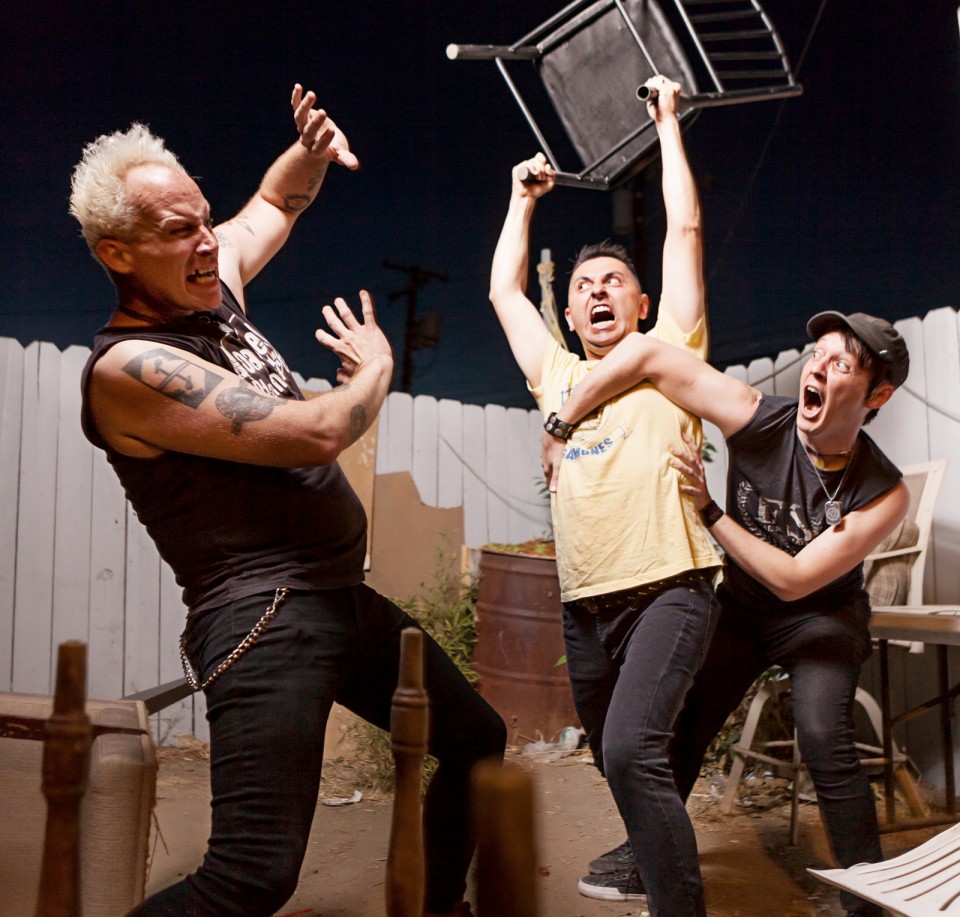
Photo by Kevin Fiscus
David Lindsay, guitarist for The O’Mulligans
I first saw them perform at their 10-year anniversary show at Capitol Garage when I was 15. I knew that playing music with my friends was all I wanted to do. It’s still all I want to do.
Over the years, I’ve been lucky enough to have my own band share the stage with Danny, Mickie [Rat, bass/vocals] and Paul [Filthy, guitar] numerous times and am lucky to have them as my peers, even though I still consider them my personal rock ‘n’ roll heroes. I’m almost 30 now, and I’m pretty sure I play it off quite cool in front of them, but I’m still a huge fan and I still aspire to be like them. The Secretions are one of the greatest bands to come out of Sacramento, and I can’t wait to see them continue for hopefully another 25 years. To this day, I know that they secrete and I suck.
Danny Secretion on how things have changed:
Twenty-five years ago, we knew all the other punk bands that were playing in Sacramento. Now, so many more young people are playing. Some bands have people that aren’t even in high school. That’s so cool. They’re out there playing and booking shows. Juniors in high school are asking us for advice on touring.
Jordan Stephen, vocalist/guitarist for Shot Trip (formerly Pilgrim)
Last summer, our good friends Simpl3Jack booked their “final” show at Cafe Colonial and asked my band and The Secretions to be a part of it. When they got on stage, The Secretions ripped through the entirety of the Ramones’ second album, Leave Home, as a tribute to Simpl3Jack heading off to college (even going so far as to replace the “Gabba Gabba Hey!” with a chant of “Simple Simple Jack!).
To see a band that had been around since before I was born humbly, and sometimes hilariously, trudge through an album of songs they had just learned to pay tribute to a couple of kids was amazing and completely inspiring. Without Danny and The Secretions, I might not have a place in any of the Sac music scene, but luckily, I do. And I’m eternally grateful that I do.
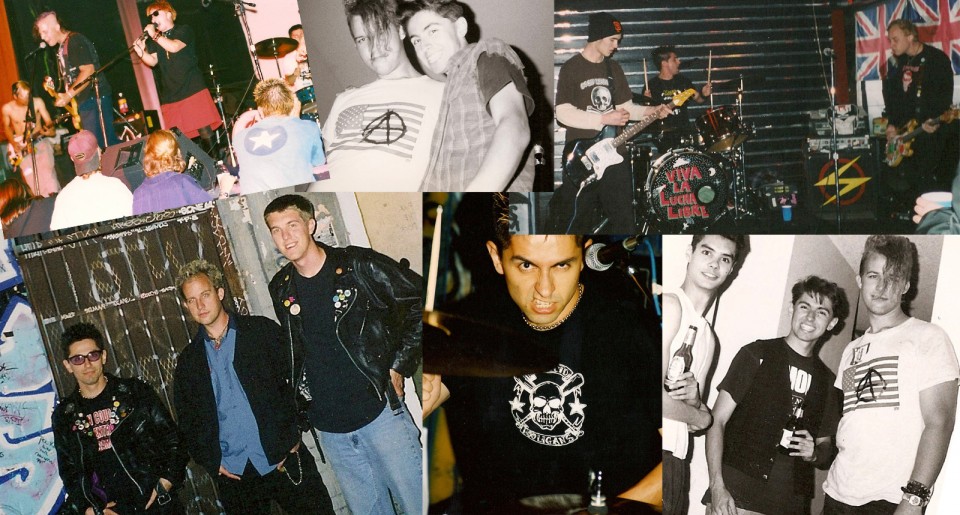
Danny Secretion on booking bands from tours past:
The 25th Anniversary show is going to be a show that you’re never going to see again. The Community and The Secretions are the only bands that play regularly. I don’t know if Final Summation or Social Concern are ever going to play again. Last time Ashtray played was two years ago.
Trying to get [some bands] back together can be like opening old wounds among the band members. Maybe there’s a reason they broke up.
All these feelings are going to come to the forefront. Me being a big crybaby, I’m probably going to be bawling the whole night, but in a good way. We want to celebrate this great trip that music has taken us on.
Liz Salmi, drummer for Luckie Strike (1997–2001)
One of my favorite things about hanging out with and being on tour with The Secretions is that no one in the band had a bad attitude. All of the people in my band self-identified as being a bunch of nerds, and The Secretions were always nice to us and fun to be with.
To save space on tour, Luckie Strike and The Secretions shared gear. As drummers, Danny Secretion and I shared a drum set. He sang in his band, and I didn’t. However, if The Secretions performed before us, Danny’s microphone would sometimes be left next to the drum set. Having a microphone is a rare treat for a drummer, and I always felt empowered to say things into the microphone during a show … If Danny could do it, I could too, and no one could stop me.
Charles Albright, guitarist for RAD
I was at Rio Americano High School when The Secretions played there in spring of ‘98. They set up and began to play. A crowd of jocks in the distance started lobbing insults and rocks. Danny said, “Shouldn’t you guys be at football practice?”
More insults, more rocks. They went into a song and Mickie yells, “Sorry we don’t sound like NOFX, motherfuckers!” Pretty soon an administrator appeared, pulled the plug and they were escorted off campus by police. One of the punkest things I have ever seen.
Danny Secretion on the story you just read:
That’s all true. We took the afternoon off work to go do that, and got kicked off of a high school. Bands that played the next two years had to sign a contract saying they didn’t know us.
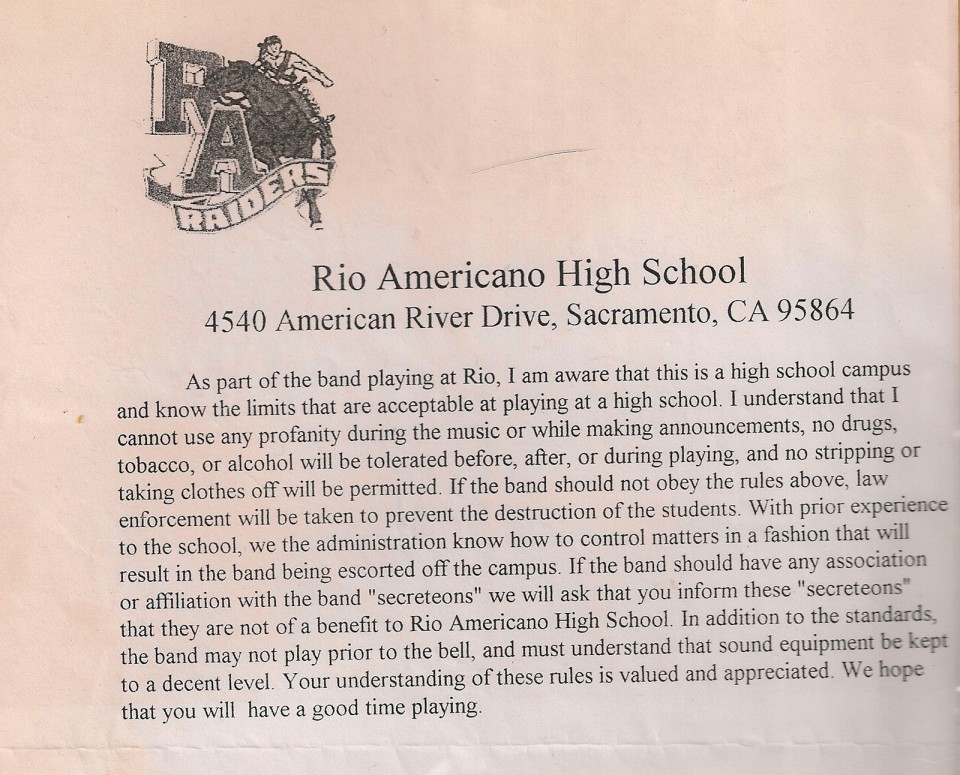
Brian Faucett (aka Brian Hanover), owner of Revolution Ink and vocalist/guitarist for Hanover Saints
You’d think after 25 years there would be nothing left to Secrete with these guys, but you’d be wrong.
Rachel Hanna, singer for The Bar Fly Effect
I got to get up on stage with The Secretions at Danny’s birthday bash in like 2013. It was a Ramones themed show, and he personally asked me if I’d sing a song with them. The guys are so much fun and so accepting and loving of everyone in the scene, I can’t imagine life without knowing them.
Sophia Flores, singer for Crude Studs
Around 2000–2003, most punk bands in Sacramento were fairly aggressive and politicized, or at least the bands I tended to follow. I wouldn’t go on to see them much until around 2006–2007, when I ran shows at the Javalounge on 16th Street.
These interactions, as well as the cooperative booking endeavors I would work on with them at The Hub, and later at Cafe Colonial, are really what showed me what these folks were made of. They strove to create opportunities for younger bands to gain experience, network and most importantly, play in a safe space. They were, and continue to be, the gateway drug to punk in Sacramento.
Danny Secretion on the annual Fuck Cancer shows:
Prior to my father’s death I was raising money for The American Cancer Society. When I lost my father to cancer, I pursued it more aggressively. I’m exhausted after those shows, but I go to bed with a smile on my soul. They’re therapeutic. I don’t want to just say, “Oh, cancer is bad.” I want to say “Fuck Cancer.” I’ve got anger in that.
Dal Basi, owner of Phono Select Records
The Secretions were one of the earliest bands I became friends with after moving to Sacramento in the early ‘90s. They blew me away with their limitless energy and buzz-saw rock ‘n’ roll, Ramones-inspired punk-roll blitzkrieg. To this day they continue to rock like a punk rock ‘n’ roll juggernaut. Every time I see them live I leave with a smile on my face. How many bands have stayed continuously good after 20-plus years?
What they do for local music deserves our respect. So, members past and present, thanks for the years of great memories, friendship and most of all, the rock ‘n’ roll!
Danny Secretion on the band’s “mentorship role”:
We can’t take any credit. If bands come to me for advice, I’m always willing to give it. The thing about being in this scene for so long is you see the people when they’re 14. A lot these kids’ first shows were Secretions shows because they felt safe and went on and developed their own bands. If we meant a lot to them, we succeeded.
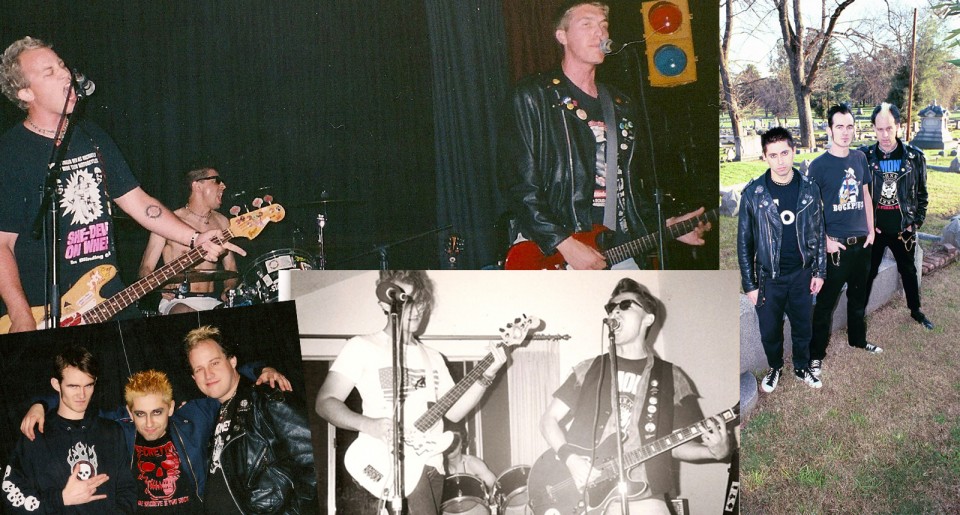
Jordan Wolfe, bassist for Final Summation
The Secretions took us under their wing very early on and really became like big brothers. We could go to them for advice on how to play out-of-town shows and how to get merch made, but even how to handle life-changing events of the good and bad variety. They were also there for advice on life changing in general and how to handle it in a positive way. When our guitarist at the time, John Powell, sadly decided to take his life at 19, Danny and Mickie were the first two people at my house to make sure Bear [Williams, guitar] and I were OK.
I’ve come to find that a lot of kids who gravitate to punk rock (the ones who don’t have a close friend or relative to hold their hand) are kids who think they are weird, or nerds, or get bullied … whatever. Outcasts of various degrees.
Once in the scene and going to shows, sometimes the same level of bullying from the “normal” world looms its ugly head and can make an already rejected person feel even more rejected. A band like The Secretions mean what they say and make it OK to be who you are, no matter how weird. Oh, you like wrestling and punk rock and horror movies but you also have a secret fascination with eating at every In-n-Out Burger in America? Cool, come out to a show and make some new friends so you have someone to go with you next time. THAT is what a Secretions show is like.
Anger and attitude and violence all have their place in punk rock, but the lovable geeky punks like Joey Ramone or a young Billie Joe Armstrong carve out an area for the not-so-angry, but still displaced. You’ll find songs to circle-pit to, songs to mosh to, songs to pogo to, songs to sing along with, songs to simply stand there and bob your head to, ALL at a Secretions show. There is literally something for everyone looking to have a good time.
They were inspired by bands like The Ramones and The Misfits, both of whom have spawned generations of bands, and I think that helps build a bridge in seeing how they did the same thing.
I know people as young as 12 and as old as 70 that know who The Secretions are. I know people in countries all over the world who know who The Secretions are. That’s insane! But it’s extremely easy to understand. They take what they do seriously, but they don’t take themselves seriously. They are confident in who they are or have come to be, but they keep any amount of shitty ego in check. They have always been humble and happy to help any up-and-coming punk band, so long as a mutual respect was upheld, which isn’t too much to ask.
They write funny songs, but involve themselves with serious causes. They always seem to find a perfect balance in making something ugly beautiful, or something sad funny in a needed way. I owe them a great deal of thanks and still, after almost 20 years, I feel incapable of finding the right way to say thank you.
I hope they know it [has] all meant something, and it [has] never been taken for granted. There are stories, rumors, legacies, lore and so on, which is why they whave such a staying power, and we as a scene and a city are lucky to have them.
Justin Cox plays guitar and sings for The Polyorchids, a local band who looks up to The Secretions like those featured above.
Celebrate 25 years of local punk rock at The Secretions 25th Anniversary Extravaganza July 9, 2016 at the Colonial Theater, located at 3522 Stockton Blvd. in Sacramento. The all-ages show is a benefit for Pit Bull Socialization and Obedience Crew, with a $10–$20 sliding-scale donation at the door. The 6 p.m. show also features a stellar line-up of bands past and present, including Final Summation, Ashtray, The Community, Social Concern and Speeding In The Rain as well as DJ sets between bands by Rob Fatal. Find out more at Facebook.com/secretions
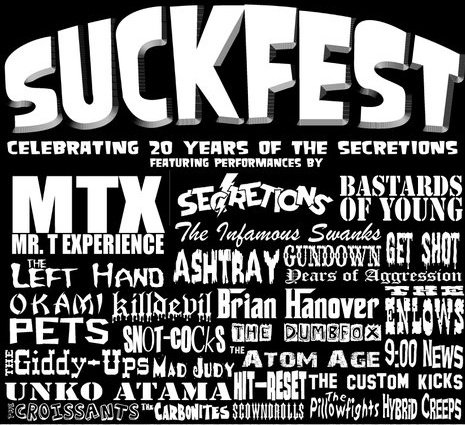
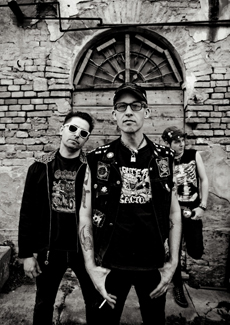
Beloved Sacramento punkers The Secretions are celebrating 20 years of being a band (congrats fellas!) with a three-day festival they have dubbed “Suck-Fest,” in honor of their slogan, “We Secrete, You Suck,” from May 27 to May 29, 2011 at Fire Escape Bar and Grill in Citrus Heights. The lineup is absolutely insane, boasting over two dozen of Sacramento’s and the Bay Area’s best bands including The Mr. T Experience, The Left Hand, Bastards of Young, Pets, The Enlows, Brian Hanover, The Snot-Cocks, The Hybrid Creeps, Ashtray, The Secretions (that’s a given) and many more. Friday, May 27, will see The Secretions playing an “alumni set” where former band members Julie Bruce, Morgan Giles, Tom Working and Kevin Stockton will make guest appearances. On Saturday, May 28, The Secretions will play a “20 Years in 60 Minutes” set where they will blast through a solid hour of tunes spanning their entire two decades as a band. And finally Sunday, May 29, will be “Secreti-oke,” where The Secretions will play a set featuring guest vocalists hand-picked by the band from some of their favorite local groups. Good luck picking just one night to attend, as they all look really, really good. You might want to just plan on camping out in the parking lot. Anybody got an RV?
-J. Carabba
Hanover Saints release a new album, look to cement their legacy in their hometown
Words by Butch Ivory
For nearly 20 years, Brian Hanover has been devouring the sights, sounds and chaos of Sacramento punk rock. The Hanover Saints have spent the most crucial chunk of that time writing, recording and improving their place in its history.
In spite of numerous lineup changes and scurrilous misunderstanding from all sides, Hanover has managed to find his focus time and time again. The Saints’ latest offering, Bitter Pills, defines once more our need for the Hanover Saints in this city, and their need for a place of their own in it. As Hanover asserts, “As far as I see the scene in my hometown…I used to think it was fragmented, but now I just think it is fractured.”
For those of us who have toiled in the underbelly of the Sacramento music scene for so long, it’s a scene that at times has struggled to find a sense of itself, a sanctuary more rooted in folklore rather than history. Having witnessed bands as diverse and wide-ranging as ‘80s skate rock legends Tales of Terror, or the working class thrash dynamo Sins of the Flesh to the more recent Ramones-esque pop sensibility of The Groovy Ghoulies or the street punk anthems of Whiskey Rebels, this city has enjoyed a wealth of talent but suffered from an absence of cohesion.
Negotiating this landscape of division, The Hanover Saints now find themselves straddling the lines of separation. For Hanover, it’s a source of inspiration rather than of a loss of faith. “It puts me back into the ‘I don’t belong anywhere’ category, and once again I feel like I did when I was 10 and heard Black Flag or 7 Seconds for the first time,” he says. “What I felt at the time was the world is a mess; I am going to change it, even if it’s just my community.”
In the following interview, with a renewed sense of purpose and a brand new release in the can, Brian Hanover discusses and argues about what drives him and the band to once again climb back into the blood-stained ring of Sacramento’s underground.
After several lineup changes and a solid new record, Murdertown, The Hanover Saints seemed to vanish. Why the comeback? Why now?
I never really wanted to put it on hold. But at the time we went on hiatus I was going through a lot mentally, business- and family-wise, and just wanted to see things from a non-band perspective. I always hoped to one day get back, when it was right for me… I think at some point I was missing something inside myself that I needed to tap into and stepping away seemed to be the most honest thing to do. I started playing solo and fell in love with not having to rely on other people to make music, but it allowed me to challenge everything I was about.
How has your solo experience affected the Hanover Saints?
I needed to shake my core, and playing live by myself channeled a lot of those feelings, beliefs, and not compromising. So three years went by and Wy [Harrell], our drummer, played on some solo stuff and we always talked about it. He has stayed loyal through it all, and when asked to play a show last June, I called the three guys up. So much time had passed, and we missed being around each other and wanted to play. It was just time. The music business side has changed so much that we knew we had to do this all ourselves, and it was the truest place for us so we moved forward. The solo thing has really helped me be more focused when writing and allowed me to take more risks… I just write and what comes out just comes out. Hanover Saints material was coming out in my writing at home, and it came at a perfect time to start playing together again. Maybe not financially, but that never has been a deciding factor, but it has its challenges with releasing music these days. Anything goes in that area now. We are really enjoying the freedom of music and how creative it can be, which is making Hanover Saints a healthier situation for all of us.
Lyrically, you seem to focus more on the personal than the political. Is this a conscious decision? Or is it a reflection of the type of songwriters you most identify with?
On this EP, I left it more open-ended. We had a solid fellow produce us at a certain point, and we had a meeting to talk about the record. He said, “When I listen to your past songs, I don’t feel like I know you, but I do know you, and I know your personal story. I challenge you to dig deep.” I think at that moment it clicked for me. I hid a lot from my past because of the pain and just wanted to bury it and forget it happened. Those things have a way of resurfacing, and it helped me to become a more honest, well-rounded songwriter instead of a topical one. There are some political leanings on “Nailed to the Letter” that have to do with right-wing conservative politicians, which is so cliché. But coming from someone who believes in the Lord and can’t relate to one word they say, it puts me back into the “I don’t belong anywhere” category… I am not down with blind hatred and when a movement becomes more important than human beings.
For many of us who have followed The Hanover Saints for several years, we have witnessed an evolution of sorts, from a “Christian punk” band to a band that has members who are Christian but play to the masses and not just to the converted, so to speak. Please explain what led you personally and the band to this decision?
It’s never been a conscious decision per se. I think it’s easy for anyone to label what they are passionate about, whether it’s straight edge, or Rasta, or whatever it may be. I just felt like our actions and music spoke for themselves. I have never denied my faith and have had record offers pulled from the table because of what I believe, but I didn’t grow up in the church, and honestly still don’t fit in most so-called churches. I honestly believe with every ounce of my being that the American church is so tied up in the political power agenda that it misses everything Jesus said. But to get back on point, I hate labels. With my life and my struggles, and believe me I am a troubled human being, I need peace in my life otherwise I flip out. But I have never wanted to alienate a person who doesn’t “believe”… All I ever wanted to do is just write real songs and maybe I am longwinded, but I’m super passionate about songwriting, and it’s a gift that I don’t take for granted. I am hoping one day I can sing better though [laughs].
It is a gift, but at some point wasn’t there a decision to be made about playing with certain bands and on certain bills that made you aware of the labels that people on all sides of the coin want to place on you?
All I ever wanted to do is play music, as far back as I can remember, and when I discovered punk in late 1984/early 1985 and picked up a guitar, I never worried about what people thought. Not till I got into my mid-20s when Hanover Saints started did I see these labels define a scene. I have always played wherever to whomever, and if these certain people want to label me, so be it. I heard people’s rhetoric from stage and then I would be hanging out with them later and helping them or they would be helping us, so sometimes the whole idea of it just seems to blur the lines, and it comes from both sides. But, being misconstrued from both sides has never stopped me. I am a really caring person inside, and the thought of someone not liking us for playing with this band or that band could eat you up inside by trying to figure it out. Music is supposed to be creative, freeing, uplifting and life-changing, and if someone is worried about what I do and where I play and who I hang out with, they are missing the best part about music. I just finally recently found a huge amount of peace knowing I am never going to fit in and it’s OK.
How has being a father changed your music, your attitude, and your desire to continue to make punk rock?
Being a father has made me a better person. More patient, more forgiving, but also making music since my son was born has made me way more focused just on the fact that he comes first and all else comes later. He is a great kid. He loves me playing music and we play tunes together. It’s a part of our family. I have to be wiser about money, but we all love punk in this house. He loves everything from Madball to Kepi Ghoulie, from Youth of Today to The Clash. He likes what he likes. I remember one day a CD ejected from the car, and it turned to classic rock. It was Skynyrd, and he said, “Dad put on some real rock ‘n’ roll, this sucks.” So I said “Give me a second, I am trying to put another CD in,” but he has no time for what he doesn’t like. But he loves all the music I play. He is my biggest fan and punk will be around forever in this household.
Regarding the future, you have a new EP, Bitter Pills, coming out this month on Revolution Ink records.
We have our first release since our record Murdertown. I am releasing it on my label, Revolution Ink Records, digitally and on CD, and a local label Pleasant Screams Cassettes is doing a limited run on cassette. Hopefully we’ll have it on vinyl early next year. Money has been super tight, and we don’t play a lot, so basically we had $500 to record our EP and I am pressing it. The rest of our money has gone to rehearsal space rent. So we are excited to get back and playing live and writing even more songs.
The new songs seem to reflect a more soulful singing style. The songs still have the aggression of Murdertown but seem to have a more Iggy and the Stooges vibe in spots. What do you credit with your growth as a singer and as a songwriter?
I always feel uncomfortable singing, but I have always had this pent-up aggression within me. I just wanted to capture that with more soulful melody, but that’s always just hanging on the edge where at any moment it can just fall apart. During this session, which was five hours of vocals, I literally was grabbing the wall and just shaking and taking myself out. I found this spot where I trusted myself with being on the edge of it falling apart. But I think since the hiatus I have written about 40 songs in various styles, like Motown, straight folk almost Pete Seeger, Woody Guthrie style, to Creedence sounding tunes. What I was realizing was how much of a music lover I am, and how much different stuff I listen to from Joy Division, 4 skins, Swervedriver, to Joan Baez, The Damned, to the Australian band The Saints, so I just felt free to be free and that I had nothing to lose.
If it sucks, it sucks, but I love these songs. It is just a new chapter for me. I always go into Hanover Saints recordings as the band’s biggest fan. I ask myself would I listen to this and what do I want from us?
Can we expect The Hanover Saints to disappear again after this record or are you guys back for a while?
I hope we are around for a while, but I like not ever knowing. I want it as raw and close to the edge as possible. I am hoping for more time. I don’t think it’s done!
Â
Â
After Two Decades of Creating Music, Brian Hanover Collects No Dust
Words Anthony Giannotti | Photo Scot Stewart
Brian Hanover is most well known for his years fronting the Sacramento-based street punk band Hanover Saints. After seven U.S. tours, two full-length records, four EPs and nearly 10 years playing together, Hanover Saints called it quits in 2005. Fast forward to 2010: the 35-year-old is about to release his second solo album, publish a book of his writings, continue running his own screen-printing business and still finds time for his family. Brian’s mindset fully embodies the D.I.Y. lifestyle, going as far as to release his solo albums on his own record label Revolution Ink Records, casually saying, “I work hard, it’s just what I do; I don’t know anything else.”
This impressive work ethic has served him well in nearly two decades of playing music. Brian slyly smirks while saying, “I’ll always play music because my mind won’t let me stop writing songs!” His easygoing demeanor and friendly attitude make it hard to not to like him. The depth and honesty of his songs allow him to win over audiences with just an acoustic guitar and harmonica. Brian likes to involve the fans at his live performances by leaving a tambourine out for people to play. He laughs as he says, “You just hope whoever grabs it at least has a little rhythm.”
He also does something a lot of older musician don’t do. He doesn’t rely on his past successes. “I want to stay relevant,” Hanover says. “I don’t want to be the crusty old guy that doesn’t know what the kids are listening to.” I had a chance to catch up with Hanover over a few pints of Guinness at one of my favorite Sacramento dive bars, The Press Club.
Thanks for meeting up with me here; I know you’re a busy guy.
No problem, thank you. I’ve only been here a couple times. One of the first times I came to The Press Club was in the early ’90s to see U.S. Bombs. It was a crazy night; I was over there behind Townhouse smoking and some kid got stabbed at the show!
So you’ve been around the Sacramento punk scene a long time.
In 1984 I was skating a launch ramp with some friends, and someone down the street was blaring 7 Seconds Walk Together Rock Together. Later that day I made my mom drive me to the record store—back then there was Dimple, Record Factory and of course Tower. I got my first punk records that day, 7 Seconds’ The Crew, and Black Flag’s Damaged. I started going to local shows in the mid-’80s. I even met my wife at a Suicidal Tendencies show back when Big Shots was still open.
Yeah congratulations on the 10-year wedding anniversary. You just got back from a little trip?
Thanks, it’s been a good 10 years. We went up to wine country for the weekend.
What’s it like trying to balance your own business, wife, kid and being a recording/touring musician?
[Laughs] There really is no balance; I think it’s priorities for sure. My wife knew what she was getting into. This is just what I do, and I was already in a band when we got together. One thing that really strengthens us as a couple is being able to do our own thing, it allows us to grow together, really surrounds us with love and grace, [laughs] a lot of grace.
Speaking of doing your own thing, I took a listen to the new release. It’s very good, quite the departure from the Hanover Saints”¦
Yeah some of it is. For this album I wanted to strip most of the songs down so I really only used an acoustic guitar, tambourine, harmonica and on a few songs electric guitar. All accept the fourth track; it actually was a Hanover Saints song that never made it on an album. It was right toward the end of it. I had already been writing solo stuff, and I brought it to practice when we were playing as a three-piece with Chris from Killing the Dream on bass.
Some of the songs on here have a real Johnny Cash/Bob Dylan singer/songwriter vibe jumping off them.
Each song is a little bit different from the other; they may have a common thread but I tried to get a large variety. Everything I sing about is all true stories, all personal experiences, kind of a Pete Seeger thing. I wanted to do this release differently because of all the different formats everything is coming out in. So the way I’m doing this release is in three volumes, every four months four more songs come out. The next volume is going to come out with a book I wrote and a coffee mug, because it all started with coffee and late-night rants for me.
How did the book come about?
Like I said, I was always at coffee shops writing. Some of the Hanover Saints lyrics I always really liked as standalone pieces. I had been cleaning out some old papers, and I found old poetry, short stories and some other stuff. I thought I’d like to publish it; I don’t know if it’s any good. Sometimes writers can think a little too much of themselves, think they’re a little bigger than life, but I went to a bookstore and picked up a book of poetry and one of the stanzas I turned to was literally four sentences. I thought, I can totally do this. It’s ridiculous.
Do you think it was the writing that attracted you to more of the acoustic style as opposed to staying in the punk rock genre?
Most of the Hanover Saints was written on acoustic or electric. It just depended on how I heard it in my head. One day I was playing the song “Bad Man” at home, Mike Erickson happened to be doing some work for me and heard it. He talked me into putting that song on Hanover Saints record Murdertown, which Pressure Point was producing. By the end of Hanover Saints I felt I had said everything that avenue would allow me to say. I really wanted to get that one on one connection with the audience. I definitely think there is a place for the loud thing. I’m always going to be into punk, and I’ll probably play it again, it’s just if you’ve said what you need to say for that part of your life I don’t feel the need to keep dragging that dead horse around.
Have you found that one-on-one connection?
I wanted to try getting up and doing a solo show but I was too afraid. Then in 2005 Kevin Seconds talked me into being on a bill with him. I just fell in love with it. Being able to play coffee shops, small bars, garages, living rooms and really some sketchy places is an entirely different, incredible, personal experience for me. You can get to know the people and the city you are playing in instead of rushing through to the next gig like when you’re in a full band. I’ve made some great friends all over the country playing solo.
You can get personal with Brian Hanover at the Blue Lamp March 17, 2010 for his 21 and older CD release or March 19, 2010 at 16th Street Café (The old Javalounge).





